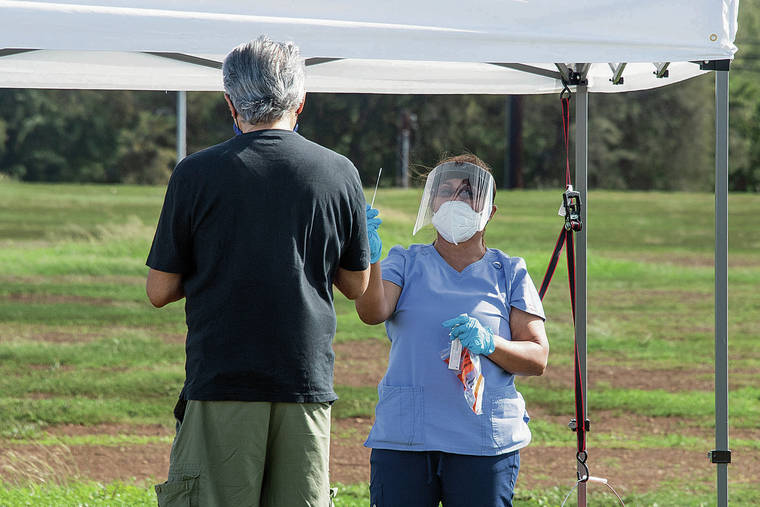It will take 6 months to vaccinate Hawaii residents, state official says

CRAIG T. KOJIMA / CKOJIMA@STARADVERTISER.COM
At Ewa Puuloa District Park. Francis Evangelista takes directions before giving himself a virus test.

CRAIG T. KOJIMA / CKOJIMA@STARADVERTISER.COM
Mayor Kirk Caldwell administered a COVID-19 self-test Thursday at the new mobile testing laboratory at Daniel K. Inouye International Airport.


Hawaii health officials are unsure how much of the population will voluntarily get immunized when a COVID-19 vaccine is available to help bring residents back to a somewhat “normal” life.
State lawmakers in the House Health Committee held an informational briefing Thursday to find out what the vaccination plan is once a likely two-dose candidate is found to be safe and effective.
“We’re looking at trying to see how we can get back to … a normal back-to-life situation, hopefully improving our economic situation,” said Ronald Balajadia, chief of the Department of Health Immunization Branch. The Centers for Disease Control and Prevention directed all states to establish a vaccination plan by Oct. 16 in anticipation of a vaccine possibly before year’s end.
“There’s so much unknown still as we move forward in this process,” Balajadia said, adding that the state hopes to get as much as 60% to 70% of the population vaccinated in order to reach so-called herd immunity. “As we all know, there is a lot of hesitancy or uncertainty out there in the community.”
In the best-case scenario — if there is ample supply of the vaccine and residents willing to get immunized — Balajadia said it would take about six months to reach that goal. Health care workers and those most at risk of contracting the novel coronavirus, including people living in congregate settings such as nursing homes, would be among the first on the priority list.
“We don’t know how many doses will be allotted,” with likely limited amounts at first, he added. “If we get just a few, that’s all we’re going to be able to vaccinate. We’re being told as production ramps up and more doses are available, then we’ll be able to then provide that to the greater community. We also know there’s a lot of people that are hesitant in wanting to get vaccinated. That’s going to be a significant factor in how we roll out.”
Don't miss out on what's happening!
Stay in touch with breaking news, as it happens, conveniently in your email inbox. It's FREE!
Health officials Thursday recorded 100 new coronavirus Opens in a new tab infections statewide, bringing the total since the start of the pandemic to 15,572. No additional deaths were reported. The official state death toll remains at 219.
Over the past 14 days, roughly 1,244 infections were reported as active cases. The number of active cases is much lower than the 3,296 infections on Wednesday due to a change in the way health officials are reporting the data to resolve “classification issues for cases unable to be reached or who are out of jurisdiction.”
Epidemiologist David Swerdlow, the global COVID vaccine medical lead on the medical development and scientific/clinical affairs team at Pfizer Vaccines, told lawmakers the country is nowhere near herd immunity, despite a dramatic increase in coronavirus infections in the United States, Europe and elsewhere around the globe.
“We believe that you need to have 50% to 60% of the population immune in order to prevent ongoing transmission. We’re probably only at 10 or 20 at the most percent,” he said, adding that as cases continue to surge across the mainland, the country is headed into “uncharted territory.”
“We crossed over 100,000 cases (in a day) in the U.S. It’s the first time any country has reported over 100,000 cases. We have no idea what’s going to happen in the next couple of days or weeks. It’s very concerning,” he said. “There are some treatments being identified … but none are really game changers. There’s still people getting sick, there’s still people being hospitalized and there’s still people dying. The only way to recapture normal lives may be with a vaccine.”
The U.S. on Thursday recorded its highest-ever new daily coronavirus cases at more than 120,000 infections, with total deaths now surpassing 234,000.



